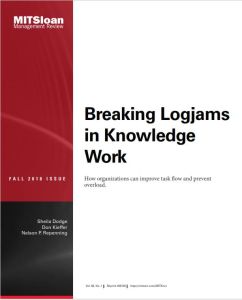加入 getAbstract 阅读摘要

加入 getAbstract 阅读摘要
Sheila Dodge, Don Kieffer and Nelson P. Repenning
Breaking Logjams in Knowledge Work
MIT Sloan Management Review, 2018
看看什么内容?
Knowledge workers can fight overload by taking a lesson from US manufacturing.
自动生成的音频
1×
登录 收听有声浓缩书。
自动生成的音频
Recommendation
Overloading your knowledge workers isn’t the path to organizational success, say the authors of this MIT Sloan Management Review article. Prevent the inefficiencies and chaos of chronically piled-up work and strained staffers by embracing “pull thinking,” a production model adopted from manufacturing.
Summary
About the Authors
Sheila Dodge manages Broad Genomics and is a Broad Institute scientist. Don Kieffer lectures at the MIT Sloan School of Management, where Nelson P. Repenning is a professor.
By the same authors
Learners who read this summary also read
Article
Article
Article



















Comment on this summary